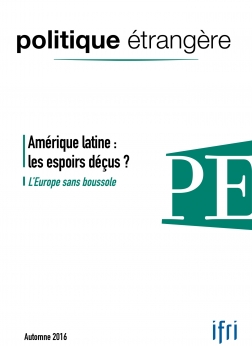
Politique étrangère n° 3/2016
Pour acheter ce numéro, contactez-nous
Recevez les numéros de l'année en cours et accédez à l'intégralité des articles en ligne.
Nestor et Cristina Kirchner ont présidé l’Argentine de 2003 à 2015, durée exceptionnelle dans l’histoire politique du pays. Cette continuité permet-elle de définir un mouvement comme le kirchnérisme, qui a évolué en fonction de la conjoncture internationale et des recompositions des alliances politiques ? Si sa continuité politique demeure incertaine, on peut le caractériser par trois articulations principales qui révèlent la portée et les limites de ce projet politique.
Nestor and Cristina Kirchner governed Argentina from 2003 to 2015, an exceptional length of time in the country’s political history. The question is whether this streak of continuity will give rise to a “Kirchnerist” movement in itself, which has adapted in accordance with the international climate and shifts in political alliances. Although its future remains uncertain, three principal elements have been identified which indicate this political movement’s scope and limitations.